Beto O'Rourke: Why this Texan is causing such a stir in the 2020 race
- Published
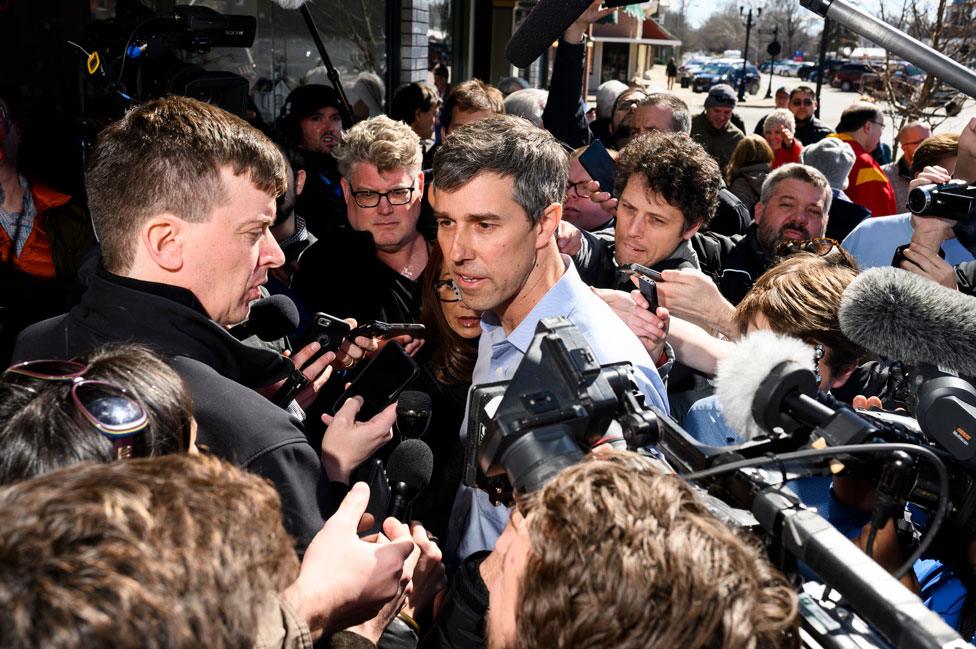
Beto O'Rourke on the campaign trail in Washington, Iowa
Beto O'Rourke made headlines while losing an election last year. Now he's running for president and already breaking fundraising records, but is this Texan the real deal?
O'Rourke arrived at a gourmet coffee shop in the small south-eastern Iowa town of Mount Pleasant and immediately jumped up on the store's counter to address the packed room.
It was the second day of his presidential campaign, which he announced via an early morning YouTube video, and the O'Rourke operation was opting for a soft launch. He visited smaller towns, in smaller venues, with little advance fanfare.
The coffee shop in Mt Pleasant, an art gallery in Washington, a sing-along bar in Mt Vernon and a house party in Dubuque were among the stops.
All told, the candidate, behind the wheel of a dirty black minivan, covered more than 800 miles in three days.
If he had travelled to the big state-college towns of Iowa City or Ames, he probably could have packed a sports arena. Instead, he went for more intimate settings in parts of the state that trend more conservative - counties that were, by and large, carried by Donald Trump when he became only the second Republican to win Iowa in a presidential election since 1984.
Last year, O'Rourke himself nearly made history when he came close to unseating a senior Republican in Texas, Ted Cruz.
It's part of O'Rourke's presidential campaign message, as it was in that failed Senate bid, that he won't take any votes for granted or look past any voters.
Elana Joram, a college professor who saw O'Rourke on Saturday in Waterloo, was impressed. The Texan is a polished speaker, she said, who hits just the right tone - the kind of candidate who could have broad appeal.
"Donald Trump and George W Bush, they can communicate in such a simple, compelling way, and the Democrats get so carried away with themselves that they just forget who they're talking to," she said. "Beto, he's really good in that respect."
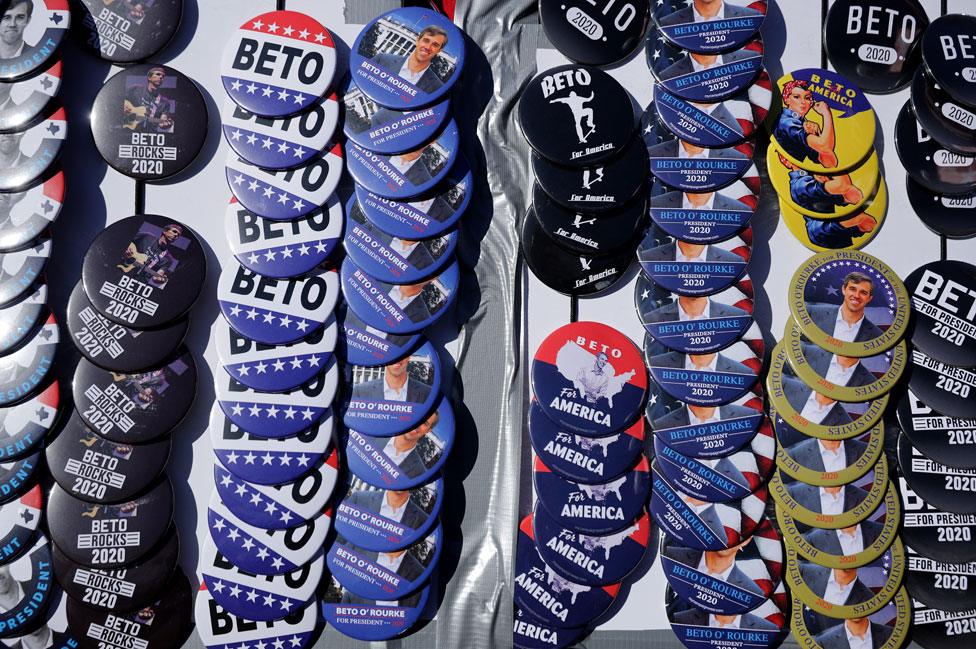
If there's a defining attribute of the O'Rourke political phenomenon, it's his ability to connect with an audience. In fact for Democrats - many of whom first learned of the Texan when a YouTube video of him, external talking about national anthem protests during his Senate campaign went viral - that may be the only attribute they know.
At least for now.
On Friday morning, O'Rourke, perched on the coffee-shop bar, launched into the topic making headlines that morning - the shooting at a mosque in New Zealand that took 50 lives.
After extending his prayers to the victims, he said the attack is part of a "larger disease of intolerance" spreading in the Western world, including the US, which he added was once thought of as the "most open, most welcoming country" in the world. Hatred, Islamophobia and intolerance are on the rise, he asserted.
"The violence predictably follows from the rhetoric that we use. We must be far better than that."
All this is a preface for what has become the central thrust of O'Rourke's nascent campaign - a call for renewed kindness and decency in the country; an insistence that Americans need to heal the way people of all political views and backgrounds interact with one another.
It sounds vaguely similar to the "hope and change" mantra that propelled Barack Obama to the presidency. It can be a winning message, even if the results of Obama's election didn't exactly heal the national divides.

Capturing the imagination
O'Rourke has drawn comparisons with other Democratic politicians - to former New York Senator Robert Kennedy, who had a similar shock of brown hair and a penchant for waxing philosophical. And to his brother, President John F Kennedy.
"The torch has been passed," one elderly supporter bubbled as O'Rourke arrived, a reference to a line about generational change from Kennedy's 1961 inaugural address.
O'Rourke said later on Friday that he's flattered people see a connection to Obama, although he says that he doesn't come "anywhere close" to the former president.
Another, more modern comparison might be more appropriate, however. And it's one O'Rourke probably won't be as eager to welcome, given a recent spate of scandal - Canadian Prime Minister Justin Trudeau.
Like O'Rourke now, four years ago the Liberal Party leader represented generational change after a stretch of conservative dominance. Both have engendered resentment from some within their party for being unqualified for the high political office they sought - a product, it was said, of unearned privilege. Yet both captured the imagination of many.
O'Rourke (46) and Trudeau (then 43) seemed young for their age, with a sometimes-too-tightly-wound energy. The Canadian on the campaign trail had a quick, breathless delivery, while the Texan's every sentence is punctuated by a cavalcade of arm gestures.

More on the 2020 race

He waves, he stretches, he chops. In one frequent move, he shoots one arm straight out and the other back - as though he has caught a wave on a surfboard or, perhaps more appropriate for the former punk band bassist, is riding a skateboard.
The mannerisms have already drawn the attention of the man he hopes to defeat next year.
"I've never seen so much hand movement," Donald Trump said last week. "Is he crazy, or is that just the way he acts?"
Reporters following O'Rourke on the stump jokingly share sped-up videos of his gyrations captured on their mobile phones, which make the candidate look like a fighter in an old Kung-fu film.
It's a manner that's easy to parody - late-night comedy spoofs are only a matter of time - but it's also memorable. And his habit of climbing on to restaurant furniture may seem a bit over-the-top, but it also emphasises his youth and vigour in a race where he will face off against several prominent septuagenarians.

'I'm not big on labels'
One of the early critiques of O'Rourke's campaign has been that it's style over substance - that the delivery and the lofty rhetoric is all there is. In his Iowa campaign appearances, however, the framework of a stump speech began to take form.
He talked about changing the attitude in Washington, with a favourite example of how the congressman worked with Republicans to pass a veteran's aid bill. He made a mention or two of his time as a member of the El Paso city council, where he said he learned to be responsive to his constituents.
And, in event after event, he pushed three issues - healthcare, immigration and climate change, which he calls "the challenge of our lifetime, perhaps the challenge of human existence".
The bulk of an O'Rourke campaign event isn't the stump speech, however, it's the question-and-answer session that comes after.
"Having the humility to listen to and understand things from other people's perspective is not just the best way to run, I think it may be the only way to win and the best way to serve once in office," he said in Cedar Rapids.
Who is Beto O'Rourke?
The topics reveal the tensions that have been pulling at all the other candidates, as well. Is he a capitalist or a socialist? A moderate or a progressive? A pragmatist or an idealist? An optimist or a realist?
O'Rourke, with his stump-speech vagueness, tries to straddle these lines - or, perhaps, blur them.
"I'm not big on labels," he said at a town hall event in El Paso last December. "I don't get all fired up about party or classifying or defining people based on a label or a group."
Under pressure from his audience, however, candidate O'Rourke sometimes tips his hand. At least three times during his Iowa tour, the Texan used some version of the line about the "perfect being the enemy of the good" - in regards to healthcare reform, gun control and the need for cross-party co-operation.
That is, needless to say, the language of a pragmatist. Democratic socialist Bernie Sanders, also running for president, would choke on those words.
Although he talks about progressive goals, his means to achieving them are incremental. He wants a $15 minimum wage, but he'll get there "as quickly as we can". He calls universal healthcare "the ultimate answer", but suggests a first step is to address the rising cost of prescription drugs and give Americans the choice of private plans or access to the government-run Medicare insurance programme.
For gun control, he backs universal background checks and a ban on new sales of assault-style rifles, allowing current owners to keep their firearms - a position that may anger both sides of the heated issue.
He says he's a capitalist, noting that he started a technology business in the late 1990s, but goes on to call the current system in the US "imperfect, unfair, unjust and racist".
"I think there is a lot more we can do to make sure that this capitalism is just," he said in Mt Pleasant.
Progressive critics also point to O'Rourke's voting record, external during his three terms as congressman, breaking ranks at times to vote with Republicans on tax, energy and immigration legislation.
In Mt Pleasant, Tom Williamson - a retired IT professonal from Fairfield, Iowa - asked O'Rourke to explain his votes.
"All I can tell you is what I've shared with you," the ex-congressman said. "The things I believe in, and the things I want to do."
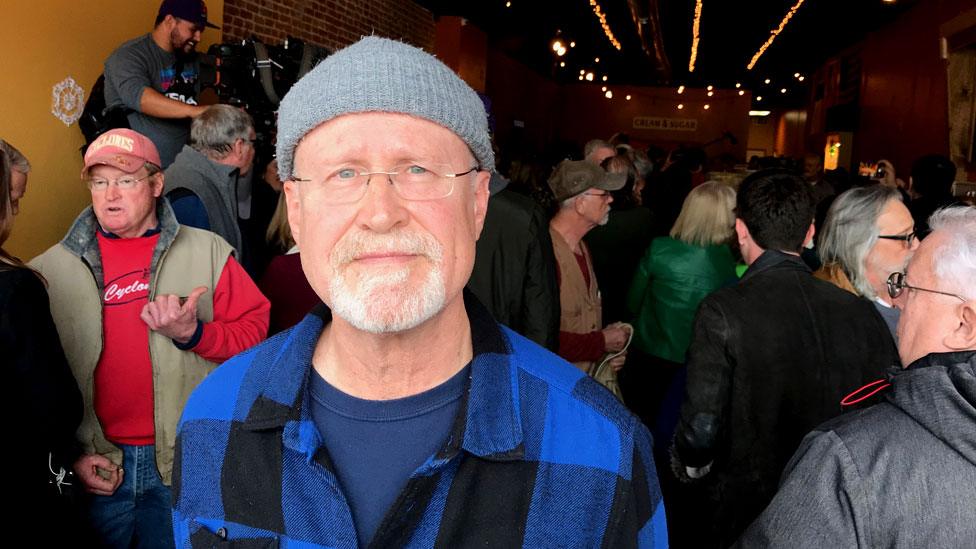
Tom Williamson thinks he will support Sanders
Williamson, who supported Bernie Sanders in 2016 and is leaning towards him in 2020, says he remains sceptical.
"If he's going to put himself squarely in the middle, I wonder how much progress we're really going to make," he says.
A few hours later in Washington, Iowa, O'Rourke felt the heat from the other side, when asked to explain a call he made in February to tear down the border wall in El Paso. The Texan sidestepped the issue entirely, instead discussing citizenship for undocumented migrants who entered the US as children - a popular position with most Americans.
"I understand the argument that we don't need to build more walls, but I don't understand the argument that we need to tear down walls," said the man who posed the question, Ryan Turner, a driving instructor from Kalona.
"If you have that pendulum swing too far to the left, you're going to have those of us in the middle sit this one out."

Past mistakes
Discussions of policy details - or lack thereof - weren't the only headaches for the newly minted candidate during his opening presidential tour.
O'Rourke's somewhat chequered past - an arrest for burglary (which he says was a misunderstanding) and driving while intoxicated (for which he says there is no excuse) - once again became uncomfortable topics which he tried to reshape as best he could.
He told an audience at a podcast recording in Cedar Rapids that he was fortunate the the incidents did not derail his life.
"It's not because I'm a great person, or I'm a genius, or I've figured anything out," he said. "A lot of it has to do with the fact that I'm a white man."
The experience, he continued, has given him an appreciation for how the criminal justice system does - and doesn't - work in the US and the need for reform.

Learn more about the 2020 candidates

Newly revealed skeletons joined old ones in O'Rourke's closet over the weekend, following a Reuters report that, as a teenager, the Texan had been a part of a notorious hacking group, external and had penned poetry and stories with violent, misogynistic themes under the pseudonym "Psychedelic Warlord".
In Cedar Rapids, O'Rourke called the language he used "hateful".
"I have to look long and hard at my actions, at the language that I have used," he said. "And I have to constantly try to do better."
The revelations may have particularly damaging resonance for O'Rourke because he's already taking criticism for, to put it bluntly, being a white man with a thin political resume running against a crop of much more experienced women and people of colour.
He seems to be getting more attention from the media, including a Vanity Fair cover story, external, and more money - $6m raised in the first 24 hours is the highest of any candidate so far.
On Saturday morning, Amy Klobuchar - a two-term senator from Minnesota who is also positioning herself as a pragmatic, solution-oriented presidential candidate - spoke at the Blackhawk County Democratic headquarters in Waterloo before a couple of cameras and a room with several dozen supporters.
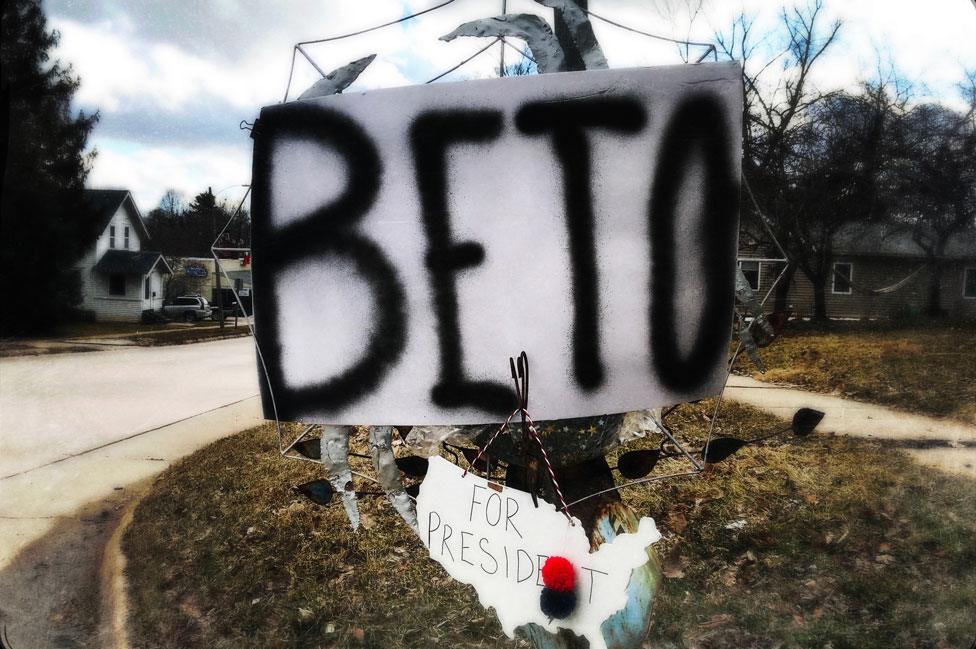
A few hours later, O'Rourke also addressed the Blackhawk County Democrats - from the bed of a red pick-up truck across the street, surrounded by a crowd of more than 150 and at least half a dozen cameras.
Part of the attention can be explained by the fact that he is the new face in Iowa, but that hasn't stopped some from taking note.
"Beto gets treated like a rock star," says Denny McCabe, a retired teacher and drummer who attended the Klobuchar event. "The women, not so much. It just seems like it's time for a woman."
O'Rourke isn't helping his cause, either. In his campaign kick-off video, his wife Amy sat silently by his side the entire time, while the candidate spoke. Several times on the trail, he mentioned that she was at home, raising their three kids, "sometimes with my help".
"Imagine [Democratic candidate Kirsten] Gillibrand saying this about her kids and still having a viable campaign," tweeted Marie Claire editor Chloe Angyal.
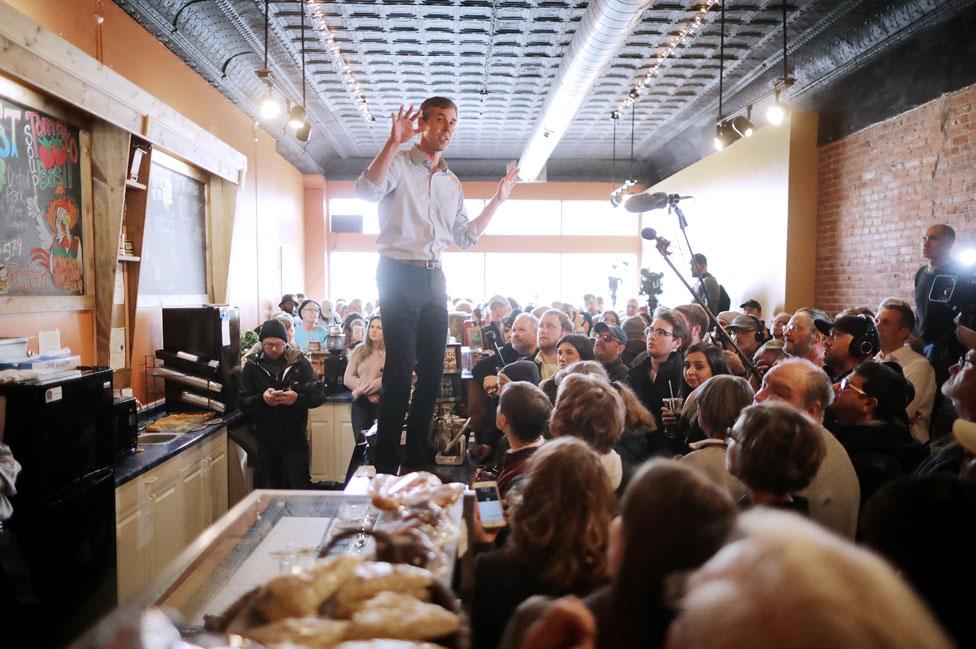
O'Rourke's table-top style has drawn attention
In Cedar Rapids on Friday night, he acknowledged his "ham-handed attempt" at giving credit to his wife had generated some deserved criticism.
"Not only will I not say that again, but I'll be more thoughtful going forward in the way that I talk about our marriage, and also the way in which I acknowledge the truth of the criticism that I have enjoyed white privilege," he said.
"I hope as I have been, in some instances, part of the problem, that I can be part of the solution, and I stand very ready and very open to those who can guide me to do a better job going forward," he said.
O'Rourke may try to pivot and shift and turn a weakness into a strength, but the reality is, at this moment, someone who looks like him, even with his Spanish nickname, may not be what the rank and file of the party are looking for.
Lori Feldman, an accountant who attended a Cory Booker rally in Indianola on Saturday, was blunt.
"I think we really need a strong black man to turn our country back after Trump," she said, and for her O'Rourke "is not going to cut it".
In Mt Pleasant, after O'Rourke's coffee shop appearance, Winfield high school senior Liana Sweezer expressed a similar sentiment.
"I would like to look for a candidate who is a woman or a person of colour, because we have just too many white men in the political system right now," she said.
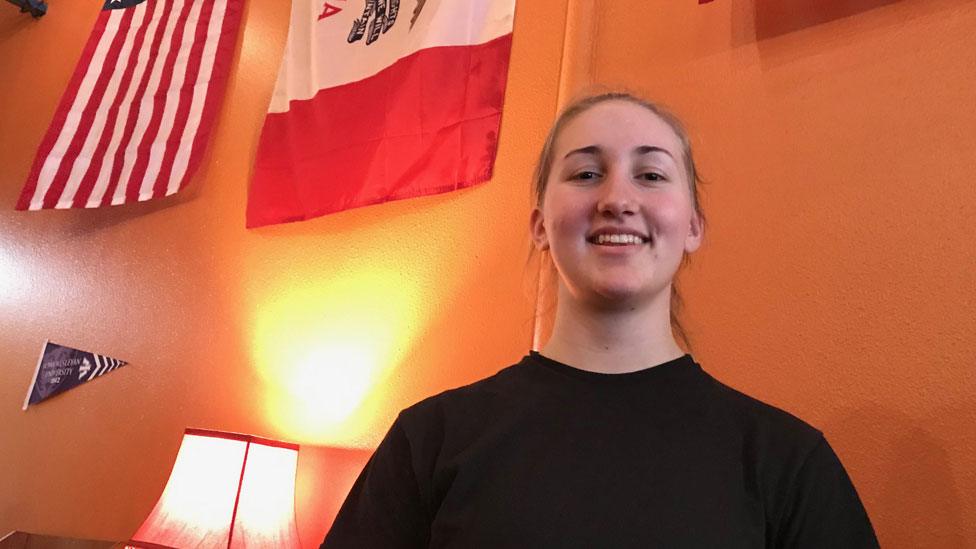
Liana Sweezer
Even Elana Joram, the Waterloo professor who praised O'Rourke's rhetorical skill, had her concerns.
"I am a little concerned that he's a white male, and not that I think that's intrinsically a problem, but there are groups of people that I think may not get motivated to come out and vote for him," she said.
In the current Democratic field, they'll have plenty of choices.

In the spotlight
Before O'Rourke's appearance in Waterloo, while Klobuchar was still shaking hands and her aides were pulling down her campaign signs in the Blackhawk County Democratic headquarters, an old Iowa political hand was throwing a bit of cold water on the Beto excitement.
"We've seen a lot of huge stars come through Iowa," said former Iowa Congressman Dave Nagle, now a lawyer in Waterloo. "The question is, can he sustain it over a long period of time? A hot start doesn't get you home."
He quipped that "presidents" Howard Dean and Ben Carson are visiting Iowa next week, a reference to past candidates who generated the kind of buzz O'Rourke is getting, only to fizzle out in the home run.
According to Nagle, the keys to Iowa success are organising and finishing strong at the end - and the first helps make the second possible.
O'Rourke (left) first made headlines on a road trip with a Democrat
O'Rourke has hired a veteran Iowa campaign strategist, Norm Sterzenbach, who helped write the convoluted rules by which the Iowa caucuses will be conducted early next year. That, at the very least, will ensure that the Texan has a solid ground game.
The pressure of national politics, the glare of the presidential spotlight, is something a candidate can't understand until they start to experience it, however. O'Rourke, with questions about his past, controversy over his comments and scrutiny of his record, is just beginning his time in the crucible.
For every Kennedy and Obama, there's a Dean and a Carson - flashes in the pan who could inspire a crowd but not get them to the voting booth when it counted.
O'Rourke has the attention. He's getting the money. He has the charisma. But it's a long way, and a long time, from these winding roads in Iowa to the White House.